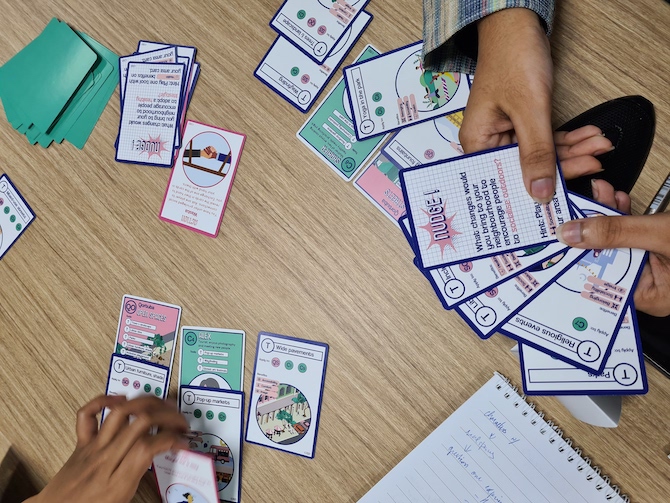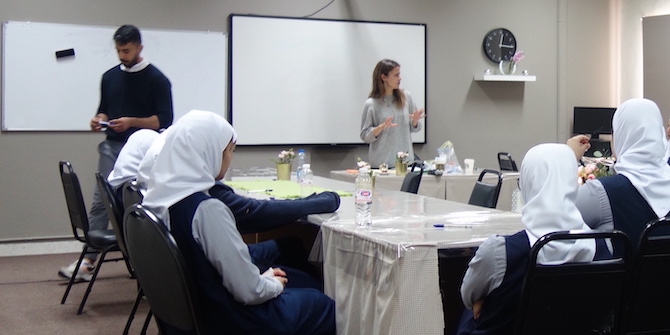by Alexandra Gomes, Sharifa Alshalfan, Asseel Al-Ragam & Tanushree Agarwal

Games can be great tools for promoting learning and behaviour change through their ability to engage interest, motivate effort, encourage task persistence and problem-based learning opportunities. These types of games are known as ‘serious games’. One example is ‘Kuwaitscapes’, a card game created with the goal of raising awareness about the potential of Kuwait’s public space use and encouraging players to reflect on different user experiences. However, initial feedback from players revealed that the game fell short of this goal, as it was seen as more of a fun, competitive game rather than a tool for learning and reflection. This was important feedback provided by players from en.v, a women-led, culturally diverse and interdisciplinary organisation working in Kuwait.
In response to this feedback, a ‘hacking Kuwaitscapes’ workshop was organised to find a balance between having fun and a more in-depth engagement with the content of the game. This included an outdoor exercise where participants embodied different characters from the game and explored how Kuwait’s public space responded to their needs. Participants were asked to work in groups and take photos representing the challenges and opportunities in a residential area of Kuwait’s public space. The results of this exercise provided an interesting reflection and discussion of how different users would ‘feel’ in these areas, highlighting challenges and opportunities in Kuwait’s public space. Participants brought attention to areas such as football pitches that were dominated by boys (a challenge for a young girl like Jana, a character card), missing libraries and miss-matched opening times (a challenge for Asseel’s character), and lack of accessibility for those that are elderly (as Mama Muneera’s character) or have disabilities. These reflections came from their attempt to embody the characters, which are often overlooked when analysing and designing public space in Kuwait.



The second phase of the workshop included playing Kuwaitscapes with its original rules, allowing participants to reflect on their previous exercise and discuss alternative forms and hacks to the rules of the game. This resulted in some fun and thought-provoking suggestions for the next iteration of the Kuwaitscapes’ rules, including proposals such as: removing some existing cards and/or adding new cards; playing in pairs; sharing an area card to encourage collaboration; introducing a debate; using storytelling to connect characters; swapping character cards; adding new challenges or powers; negotiating; limiting resources; adding a currency resource to the game; and changing the type and layout of the game. These suggestions, developed further below, aimed to address a higher ’emotional’ engagement with both characters and space in a game that was designed to be ‘serious’ and fun:
- Sharing objectives – Players work in pairs and share an area card, promoting collaboration and empathy instead of competition.
- Storytelling – Incorporating storytelling or ‘roleplay’ to connect players to their characters and encourage teamwork and envisage a common strategy to win.
- Changing perspectives – Swapping character cards during gameplay to encourage reflection on different characters’ challenges.
- Increasing challenges or powers – Adding extra characteristics to characters to increase difficulty and reflection on their needs and challenges (e.g. adding a ‘disability’ card to an arbitrary character, or providing one of the adult characters with the Wasta card ‘power’). Forcing players to reflect on how these new characteristics can influence these characters’ needs and challenges and at the same affect other characters.
- Negotiating – Adding negotiation to the ‘Mayor for a Day’ card, requiring players to convince the ‘mayor’ to help them.
- Limiting resources – Introducing new challenges or limiting resources such as: removing duplicate tool cards to reduce the availability of resources; creating new action cards (e.g dust storms), or adding a currency, requiring players to collaborate and offer services to others. Services that would have to reflect the players’ character and their bio/persona.
- Encouraging critical thinking – Using nudge cards to encourage design thinking and alternative solutions. Stimulating participants to discuss, design and create tools together, or to challenge other players.
- Mapping Kuwaitscapes – Transforming the game into a board game where players must pass through different areas and use tools to improve them.
- Using virtual reality – Creating a virtual reality version of the game for an immersive experience. Where players would use virtual geo-tagged tools to improve real spaces. Ideas and data patterns from the game could then be used to help policy-makers and planners.
The nine ‘hacks’ suggested during the workshop require further refinement and development, but they can offer new ways to enjoy the game while addressing limitations and encouraging wider dialogue. The workshop encouraged the use of the hashtag #Kuwaitscapes to consolidate information about the game and create a database of users, spaces, challenges, and opportunities, so that Kuwaitscapes can also be used as a source of open-access data to survey Kuwait’s public space and highlight positive examples of urban design.
This workshop was an important opportunity to critically reflect on the game and develop it in a direction that suits its original goals. The Kuwaitscapes team thanks the Kuwait Foundation for the Advancement of Sciences in the person of Yousef Al-Mazeedi and Dalal Alhashash, and all en.v participants for their engagement and participation. With special thanks to Eleanor, Layan, and Mohammed.
This is the third in a series of posts about the Kuwaitscapes game and its uses, looking at how creative thinking and an understanding of the city can inspire game and design-based interventions to make Kuwait’s public space more welcoming to all. Please follow #Kuwaitscapes on social media for updates! Read the introduction here, and see other pieces below.
In this series:
- Using Games for Inclusive Research and Policy Design – The Case of Kuwait Scapes by Alexandra Gomes, Tanushree Agarwali, Asseel Al-Ragam & Sharifa Alshalfan
- Reimagining Public Space Through Cards in Kuwait by Alexandra Gomes, Sharifa Alshalfan, Asseel Al-Ragam & Tanushree Agarwali
- Hacking Kuwaitscapes by Alexandra Gomes, Sharifa Alshalfan, Asseel Al-Ragam & Tanushree Agarwal
[To read more on this and everything Middle East, the LSE Middle East Centre Library is now open for browsing and borrowing for LSE students and staff. For more information, please visit the MEC Library page.]






